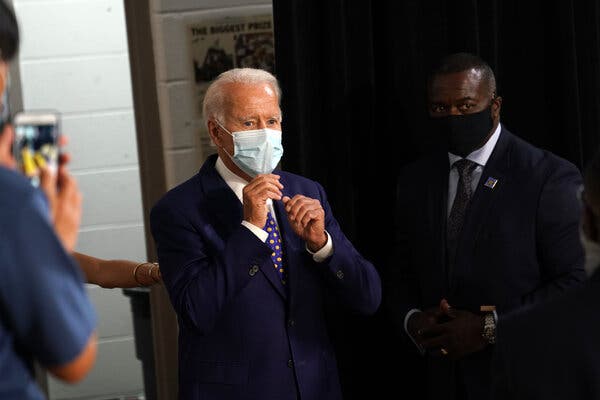Advertisement
But a new assessment says China would prefer to see the president defeated, though it is not clear Beijing is doing much to meddle in the 2020 campaign to help Joseph R. Biden Jr.

WASHINGTON — Russia is using a range of techniques to denigrate Joseph R. Biden Jr., American intelligence officials said Friday in their first public assessment that Moscow continues to try to interfere in the 2020 campaign to help President Trump.
At the same time, the officials said China preferred that Mr. Trump be defeated in November and was weighing whether to take more aggressive action in the election.
But officials briefed on the intelligence said that Russia was the far graver, and more immediate, threat. While China seeks to gain influence in American politics, its leaders have not yet decided to wade directly into the presidential contest, however much they may dislike Mr. Trump, the officials said.
The assessment, included in a statement released by William R. Evanina, the director of the National Counterintelligence and Security Center, suggested the intelligence community was treading carefully, reflecting the political heat generated by previous findings.
The White House has objected in the past to conclusions that Moscow is working to help Mr. Trump, and Democrats on Capitol Hill have expressed growing concern that the intelligence agencies are not being forthright enough about Russia’s preference for him and that the agencies are introducing China’s anti-Trump stance to balance the scales.
The assessment appeared to draw a distinction between what it called the “range of measures” being deployed by Moscow to influence the election and its conclusion that China prefers that Mr. Trump be defeated.
It cited efforts coming out of pro-Russia forces in Ukraine to damage Mr. Biden and Kremlin-linked figures who “are also seeking to boost President Trump’s candidacy on social media and Russian television.”
China, it said, has so far signaled its position mostly through increased public criticism of the administration’s tough line on China on a variety of fronts.
An American official briefed on the intelligence said it was wrong to equate the two countries. Russia, the official said, is a tornado, capable of inflicting damage on American democracy now. China is more like climate change, the official said: The threat is real and grave, but more long term.
Democratic lawmakers made the same point about the report, which also found that Iran was seeking “to undermine U.S. democratic institutions, President Trump, and to divide the country” ahead of the general election.
“Unfortunately, today’s statement still treats three actors of differing intent and capability as equal threats to our democratic elections,” Speaker Nancy Pelosi and Representative Adam B. Schiff, the chairman of the House Intelligence Committee, said in a joint statement.
Asked about the report during a news conference on Friday night at his golf club in New Jersey, Mr. Trump said, “The last person Russia wants to see in office is Donald Trump because nobody’s been tougher on Russia than I have.” He said that if Mr. Biden won the presidency, “China would own our country.”
Aides and allies of Mr. Biden assailed Mr. Trump, saying that he had repeatedly sided with President Vladimir V. Putin on whether Russia had intervened to help him in 2016 and that he had been impeached by the House for trying to pressure Ukraine into helping him undercut Mr. Biden.
“Donald Trump has publicly and repeatedly invited, emboldened and even tried to coerce foreign interference in American elections,” said Tony Blinken, a senior adviser to the former vice president.

It is not clear how much China is doing to interfere directly in the presidential election. Intelligence officials have briefed Congress in recent days that much of Beijing’s focus is on state and local races. But Mr. Evanina’s statement on Friday suggested China was on weighing an increased effort.
“Although China will continue to weigh the risks and benefits of aggressive action, its public rhetoric over the past few months has grown increasingly critical of the current administration’s Covid-19 response, closure of China’s Houston Consulate and actions on other issues,” Mr. Evanina said.
Mr. Evanina pointed to growing tensions over territorial claims in the South China Sea, Hong Kong autonomy, the TikTok app and other issues. China, officials have said, has also tried to collect information on the presidential campaigns, as it has in previous contests.
The release on Friday was short on specifics, but that was largely because the intelligence community is intent on trying to protect its sources of information, said Senator Angus King, the Maine independent who caucuses with the Democrats.
“The director has basically put the American people on notice that Russia in particular, also China and Iran, are going to be trying to meddle in this election and undermine our democratic system,” said Mr. King, a member of the Senate Intelligence Committee.
Intelligence officials said there was no way to avoid political criticism when releasing information about the election. An official with the Office of the Director of National Intelligence said that the goal was not to rank order threats and that Russia, China and Iran all pose a danger to the election.
Fighting over the intelligence reports, the official said, only benefits adversaries trying to sow divisions.
While both Beijing and Moscow have a preference, the Chinese and Russian influence campaigns are very different, officials said.
Outside of a few scattered examples, it is hard to find much evidence of intensifying Chinese influence efforts that could have a national effect.
Much of what China is doing currently amounts to using its economic might to influence local politics, officials said. But that is hardly new. Beijing is also using a variety of means to push back on various Trump administration policies, including tariffs and bans on Chinese tech companies, but those efforts are not covert and it is unclear if they would have an effect on presidential politics.
Russia, but not China, is trying to “actively influence” the outcome of the 2020 election, said the American official briefed on the underlying intelligence.
“The fact that adversaries like China or Iran don’t like an American president’s policies is normal fare,” said Jeremy Bash, a former Obama administration official. “What’s abnormal, disturbing and dangerous is that an adversary like Russia is actively trying to get Trump re-elected.”
Russia tried to use influence campaigns during 2018 midterm voting to try to sway public opinion, but it did not successfully tamper with voting infrastructure.
Mr. Evanina said it would be difficult for adversarial countries to try to manipulate voting results on a large scale. But nevertheless, the countries could try to interfere in the voting process or take steps aimed at “calling into question the validity of the election results.”
The new release comes on the heels of congressional briefings that have alarmed lawmakers, particularly Democrats. Those briefings have described a stepped-up Chinese pressure campaign, as well as efforts by Moscow to paint Mr. Biden as corrupt.
“Ahead of the 2020 U.S. elections, foreign states will continue to use covert and overt influence measures in their attempts to sway U.S. voters’ preferences and perspectives, shift U.S. policies, increase discord in the United States, and undermine the American people’s confidence in our democratic process,” Mr. Evanina said in a statement.
The statement called out Andriy Derkach, a pro-Russia member of Ukraine’s Parliament who has been involved in releasing information about Mr. Biden. Intelligence officials said he had ties to Russian intelligence.
Intelligence officials have briefed Congress in recent weeks on details of the Russian efforts to tarnish Mr. Biden as corrupt, prompting senior Democrats to request more information.
A Senate committee led by Senator Ron Johnson, Republican of Wisconsin, has been leading an investigation of Mr. Biden’s son Hunter Biden and his work for Burisma, a Ukrainian energy firm. Some intelligence officials have said that a witness the committee was seeking to call was a witting or unwitting agent of Russian disinformation.
Democrats had pushed intelligence officials to release more information to the public, arguing that only a broad declassification of the foreign interference attempts can inoculate voters against attempts by Russia, China or other countries to try to influence voting.
In meetings on Capitol Hill, Mr. Evanina and other intelligence officials have expanded their warnings beyond Russia and have included China and Iran, as well. This year, the Office of the Director of National Intelligence put Mr. Evanina in charge of election security briefings to Congress and the campaigns.
Intelligence and other officials in recent days have been stepping up their releases of information about foreign interference efforts, and the State Department has sent texts to cellphones around the world advertising a $10 million reward for information on would-be election hackers.
How effective China’s campaign or Russia’s efforts to smear Mr. Biden as corrupt have been is not clear. Intelligence agencies focus their work on the intentions of foreign governments, and steer clear of assessing if those efforts have had an effect on American voters.
The first reactions from Capitol Hill to the release of the assessment were positive. A joint statement by the Republican and Democratic leaders of the Senate Intelligence Committee praised it, and asked colleagues to refrain from politicizing Mr. Evanina’s statement.
Senator Marco Rubio of Florida, the acting Republican chairman of the committee, and Senator Mark Warner of Virginia, the Democratic vice chairman, said they hoped Mr. Evanina continued to make more information available to the public. But they praised him for responding to calls for more information.
“Evanina’s statement highlights some of the serious and ongoing threats to our election from China, Russia, and Iran,” the two men’s joint statement said. “Everyone — from the voting public, local officials, and members of Congress — needs to be aware of these threats.”
Maggie Haberman contributed reporting from New York.
-
-
- Here are 13 women who have been under consideration to be Joe Biden’s running mate, and why each might be chosen — and might not be.
-



